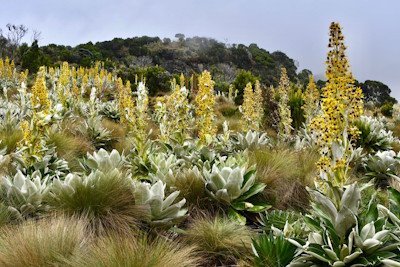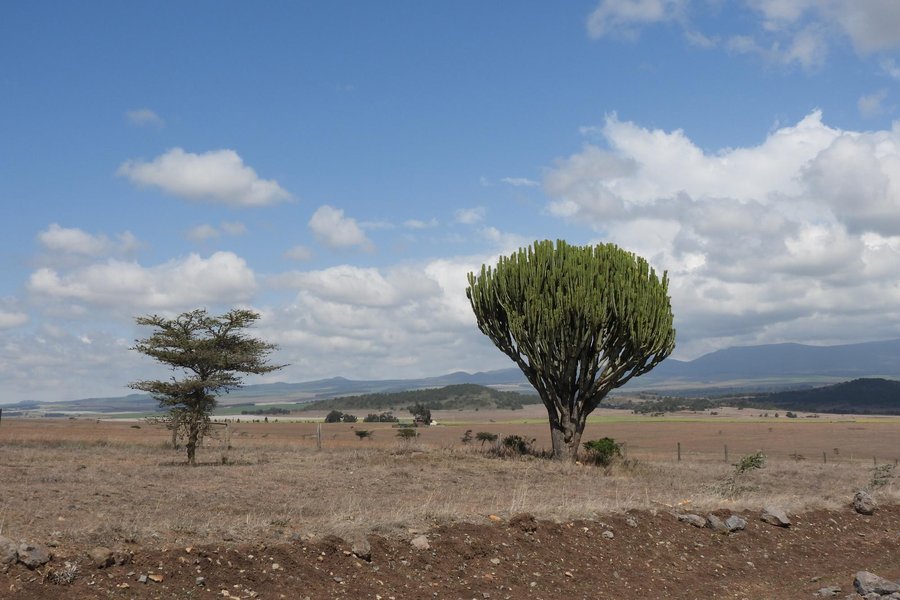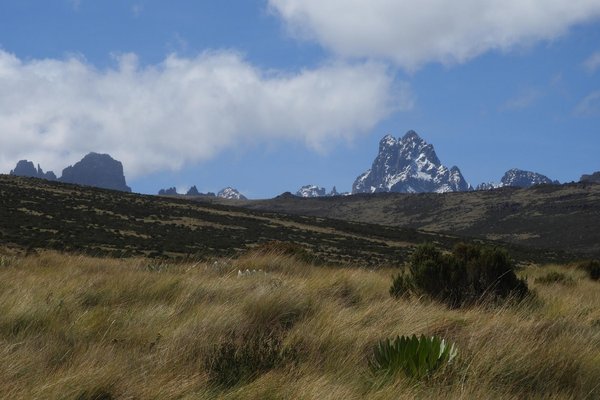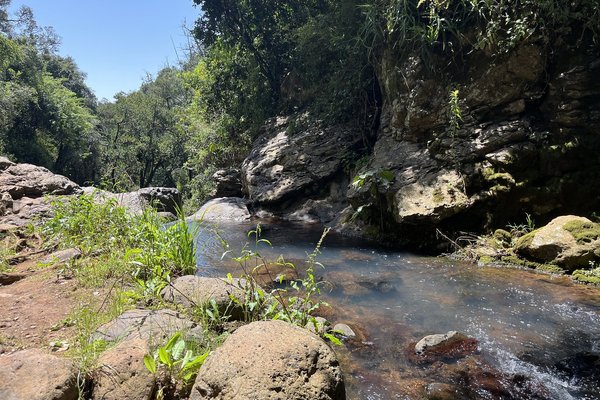Kenya
Mount Kenya
Mount Kenya National Park / Natural Forest protects the afro-alpine region surrounding Mount Kenya, the second-highest mountain in Africa at 5,199 m.
The mountain is an extinct volcano with 12 remnant glaciers on its slopes, which are retreating rapidly. Also, there are several small lakes and it is the main water catchment area for two large rivers in Kenya; the Tana and the Ewaso Ng'iso North. The site also comprises the Lewa Wildlife Conservancy and Ngare Ndare Forest Reserve in the foothills, which are within the African elephant migration route.
Community Perspective: Els has covered Ngare Ndare Forest, while Randi did a worthwhile day hike in Mount Kenya NP.
Site Info
Official Information
- Full Name
- Mount Kenya National Park / Natural Forest (ID: 800)
- Country
- Kenya
- Status
-
Inscribed 1997
Site history
History of Mount Kenya
- 2013: Extended
- To include Lewa Wildlife Conservancy and Ngare Ndare Forest Reserve
- 1997: Inscribed
- Inscribed
- Type
- Natural
- Criteria
- vii
- ix
Links
- UNESCO
- whc.unesco.org
- Official
-
- ngarendare.org — Ngare Ndare Forest Trust
- kws.go.ke — Kenya Wildlife Service
- Related
-
- en.wikipedia.org — Wiki on Mount Kenya
All Links
UNESCO.org
- whc.unesco.org — whc.unesco.org/
Official Website
- ngarendare.org — Ngare Ndare Forest Trust
- kws.go.ke — Kenya Wildlife Service
Related Resources
- en.wikipedia.org — Wiki on Mount Kenya
News Article
- Dec. 8, 2023 scmp.com — Why Africa’s Mount Kenya risks becoming as polluted as Kilimanjaro, as access to its peaks is made easier for visitors
- March 5, 2019 whc.unesco.org — For more than a week, devastating fires have raged in Mount Kenya National Park
- Sept. 8, 2012 bbc.co.uk — Mt Kenya to get electric fence to stop wildlife straying
- March 20, 2012 washingtonpost.com — Elephants, wildlife flee as fire spreads across Mount Kenya
Community Information
- Community Category
- Natural landscape: Mountain
Travel Information
High entrance fees
Recent Connections
-
Named after a Mountain
Mt Kenya 5199m -
Country named after them
The mountain was named by Krapf as bo… -
High entrance fees
52 USD
Connections of Mount Kenya
- Individual People
-
-
Sir Wilfred Thesiger
1970See prmprints.com
-
Charles Darwin
The Darwin Glacier was named by the geologist John Walter Gregory - the first person to reach the icefields of Mt Kenya in 1892/3.In his book "The Great Rift Valley" he describes that this "was so named as we owe to Darwin the first precise description of a glacial valley in England" -
Leakey Family
Gray Leakey, a cousin of Louis Leakey, was taken captive and led into the forests of Mount Kenya, high up on the mountain, where "he was buried alive and upside down in deep red soil" (during the Mau Mau insurgency 1952-1960)See www.codesria.org
-
- Geography
-
-
World's most prominent mountains
32nd most prominent (3825m/1374m/Kilimanjaro) -
Territorial Highest points
5199m/17057ft -
Glaciers
Northey, Krapf, Gregory, Lewis, Diamond, Darwin, Forel, Heim, Tyndall, Cesar, Josef. (Not expected to last longer than another 30 years) -
Volcanic plugs
"The summit of Mt. Kenya is the remnant of a volcanic plug which was left as softer materials were eroded by glaciation" (AB ev) -
Equator
its peak "is about 16.5 kilometres (10.3 miles) south of the equator" (wiki) -
Highest (over 5000m)
Mt Kenya (5119m)
-
- Trivia
-
-
On beer cans and bottles
White Cap Lager depicts the snow-capped peak of Mount Kenya. -
Depicted on National Coat of Arms
Kenya -
Fatal Accidents or 'disasters'
"On July 19, 2003, a South African registered aircraft, carrying 12 passengers and two crew, crashed into Mount Kenya at Point Lenana: nobody survived"
-
- Ecology
-
-
Somalia-Masai regional centre of endemism
"the area lies at the interface of the Afromontane and Somali biomes and within the Somali – Maasai Center of Endemism" (AB ev) -
African Wild Dog
Known to use the (elephant) wildlife corridor (IUCN Outlook 2020) -
Elephants
African elephant -
Rhino habitat
black rhinoceros -
Stratovolcanoes
"Mount Kenya is a stratovolcano that was active in the Plio-Pleistocene." (wiki) -
Big Five
Lewa Wildlife Conservancy: It ... includes the big five (lion, leopard, elephant, rhino and African Buffalo) (wiki) -
Critically endangered fauna species
(Eastern) Black Rhino: "Lewa holds over 12% of Kenya's eastern black rhinoceros population" (wiki) -
Eagles
Ayres hawk eagle (Official description) -
Lions
Lewa Wildlife Conservancy : "There are currently 44 lions acros the Lewa-Borana Landscape."See www.lewa.org
-
Megaherbs
giant groundselsSee en.wikipedia.org
-
Mammal Migrations
"Lewa Wildlife Conservancy and Ngare Ndare Forest Reserve also lie within the traditional migration route of the African elephant population of the Mount Kenya – Somali/Maasai ecosystem and has always been the traditional dry season feeding area for elephants." (OUV)
-
- Damaged
-
-
Poaching
Subsistence hunting is carried out in the forested lower slopes, and to a lesser extent at higher elevations where its impact is limited due to the extremely rugged terrain and difficulty of capturing prey species. The few remaining critically endangered mountain bongo antelopes are at high risk to subsistence hunting. The African elephant remain also at high risk due to ivory poaching. -
Wildfires
2019: "fires have already destroyed more than 80,000 hectares of forest and grassland, which represents almost half the area of the World Heritage site"See whc.unesco.org
-
- World Heritage Process
-
-
First inscriptions
Kenya: two inscriptions in 1997, with Mount Kenya National Park/Natural Forest as the lowest number -
Extended
2013: To include Lewa Wildlife Conservancy and Ngare Ndare Forest Reserve -
Perfect Inscriptions
1997
-
- Religion and Belief
-
-
Sacred Mountains
It has been regarded as a sacred mountain by neighbouring Kikuyu and Meru people. -
Axis Mundi
See en.wikipedia.org
-
- Human Activity
-
-
Canopy Walkways
Ngare Ndare Forest: "A 450 m long bridge suspended 30 feet above the ground, longest in East Africa."See ngarendare.org
-
- Constructions
-
-
Via Ferrata
"In July 2012 a new via ferrata developed by the Kenyan Wildlife Services (KWS), opened on Mount Kenya" (Wiki)
-
- WHS on Other Lists
-
-
Alliance for Zero Extinction
Grammomys gigas (Giant Thicket Rat) -
WWF Global 200
Terrestrial, Montane Grasslands and Shrublands: (104) East African MoorlandsSee web.archive.org
-
IUCN Green List
Lewa Wildlife Conservancy -
Centres of Plant Diversity
Af62 Mount Kenya - "Vegetation varies with altitude and rainfall and the property supports a rich alpine and subalpine flora" -
Biodiversity hotspot
Eastern Afromontane -
World Biosphere Reserves
Mount Kenya (1978) -
World Heritage Forest Programme
-
- Timeline
-
-
Pliocene
Mount Kenya is a stratovolcano that was active in the Plio-Pleistocene (wiki) / It is an ancient extinct volcano, which during its period of activity (3.1-2.6 million years ago) is thought to have risen to 6,500 m (AB ev)
-
- Visiting conditions
-
-
Foreigner prices
Different prices for Citizens, Residents and Non-Residents. From 430 Kenyan shilling to 52 USD.See www.kws.go.ke
-
High entrance fees
52 USD
-
- WHS Names
-
-
Named after a Mountain
Mt Kenya 5199m -
Country named after them
The mountain was named by Krapf as both Kenia and Kegnia when he first sited it in 1849 apparently using a native word which he recorded (possibly Kikuyu Kirinyaga?). The colony in which it stands was originally known just as "British East Africa Protectorate" but the growing number of white settlers led to a change of status in 1920 when the "Kenya Colony" was created - named after the mountain. Because of their indiginous origins the names of both the mountian and the country were carried forward unaltered into the post colonial era.
-
News
- scmp.com 12/08/2023
- Why Africa’s Mount Kenya risks bec…
- whc.unesco.org 03/05/2019
- For more than a week, devastating …
- bbc.co.uk 09/08/2012
- Mt Kenya to get electric fence to …
Recent Visitors
Visitors of Mount Kenya
- AmyAbroad
- amychemu
- Ask Gudmundsen
- Aspasia
- Atila Ege
- cflw
- Dan Pettigrew
- Elf21
- Els Slots
- Gernot
- hegeline@icloud.com
- Iain Jackson
- Ingrid
- Jacob Otten
- Javier Coro
- John Smaranda
- Joyce van Soest
- Kjlauer
- Knut
- Kurt Lauer
- kutasp
- Ludvan
- Luis Filipe Gaspar
- Marlies van Wolfswinkel
- Martin
- Michael Ayers
- Morodhi
- Naim Y
- Niall Sclater
- Nihal Ege
- PabloNorte
- Pat Martin
- Paul Schofield
- Randi Thomsen
- Roman Bruehwiler
- shoaibmnagi
- Solivagant
- Stanislaw Warwas
- Svein Elias
- Thomas Buechler
- Timothy C Easton
- Vanessa Buechler
- Waxwing
- Yongcheng Liu
- Zoë Sheng
Community Reviews
Show full reviews
As Els pointed out, there aren’t many reviews out there to help plan a visit to Mount Kenya. This is Africa’s second-highest mountain, reaching 5,199 meters, and most people associate it with demanding multi-day climbs. But what about a day hike? Is it even possible—and is it worth the steep $50 park entry fee?
We decided to find out for ourselves.
We sorted out the e-ticket the night before. Entry to Kenyan national parks now has to be booked and paid online through the E-Citizen platform, which isn’t exactly suited for foreigners. And because we also have to pay for a car, the payment has to be done twice, one for the car in KES, and for us in US$. But with a bit of effort—and using Edge browser on a PC—we got it to work this time. It feels good to have the E-ticket on hand when we arrived at the gate.
We left Naro Moru Lodge on a clear, beautiful morning around 8:30 AM, and could even see the summit of the mountain from afar. It’s about a 30-minute drive to the Naro Moru Gate where we were warmly welcomed by a friendly ranger. She asked whether we were planning to hike or just drive up to the Meteorological Station. That answered one big question—we could drive to Met Station! We were not sure about that. The station is located at around 3,000 meters and about 8 km from the gate. If you want to …
Keep reading 1 comment
I have always wondered how a site that has been ticked by 63 members so far has only had one, tiny review dating back to 2006. I would guess that 90% of the “visits” here were drive-by ones. Even then, the mountain, with its characteristic rugged, glaciated peaks, isn’t always easy to see, as it is often covered in clouds. The best I could get was a silhouette at 7 in the morning from the pool area of my lodge.
Mount Kenya is known for its several vegetation bands with Afro-alpine flora from the base to the peak. I stayed for 3 nights at the Naro Moru River Lodge, a little oasis outside of the park borders, where you can experience the vegetation and wildlife of the lower regions of the mountain at 1,970m altitude. At night, you may hear the screaming of the tree hyraxes, and during the day, you’ll find many birds typical for the region (the lodge’s bird list includes a significant number of 399 species). The Cinnamon-chested bee-eaters put on a good show, but my favourite was the White-eyed Slaty-Flycatcher with its distinctive white ring around the eyes.
To enter the core zone of the WHS, there are three options: Mount Kenya National Park, Lewa Wildlife Conservancy, and Ngare Ndare Forest. The latter two were extensions and also include the Elephant corridor, where African elephants migrate with the season, away from the mountain when it gets too cold, and back when it gets too dry in …
Keep reading 0 comments
There is a drought now all over Kenya, as the mini rainy season of Nov 2005 did not come. So the Masai bring their cattle and sheep up to the tourist area. This drove away the animals. The cows meanwhile are dying from the altitude and new germs which they have no resistence to. Seeing a lot of dead and dying cows being butchered was not fun.
Keep reading 0 comments



